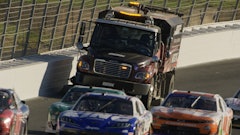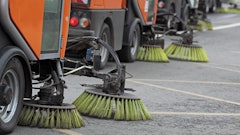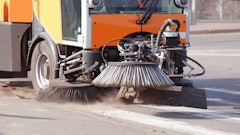Regardless of the size of your sweeping company, risk transfer controls are an important part of any sweeping contractor's risk management program.
When understood and used properly, insurance and its various forms protects sweeping contractors by insuring them against risks associated with their work. Just as importantly proper insurance assigns risk where it belongs and prevents others from transferring their risk to you.
Does this sound familiar?
You put together a bid package, obtain a certificate of insurance to be attached to the bid, which you submit and hope for the best. Then you are successful and win the bid. Good for you! You go to work, providing the sweeping service as specified in the contract. Upon completing the job you hopefully have maintained the almighty, ever-shrinking profit margin. After all, isn't that why entrepreneurs put everything on the line?
Now for the surprise! The job is complete, you made a profit, and you're on to conducting other business. Months pass and you receive a summons and complaint in the mail. Upon review, you are outraged that it involves an incident that you believe has nothing to do with the scope of work you were contracted to perform. You forward the claim to your insurance carrier under protest, with the belief that they should not award the claimant any damages.
You are deposed on the case, spending even more of your valuable time, and after all is said and done, you find that your insurance company settled the case and compensated the claimant. You know this action will undoubtedly have a negative impact on your insurance loss information, which could make it more difficult for your sweeping company to obtain the most competitive insurance pricing.
Unfortunately this scenario is commonplace in today's hurried business environment where in order to compete, a lot of things — important things — get overlooked.
What you need to know
But before you can tackle the best ways to protect yourself and your business, you need to understand just what these insurance documents mean. Only then can you know how best to implement them into your sweeping contracts without jeopardizing your ability to compete and/or impeding your insurance.
What is a Certificate of Insurance? This is a form issued by the contractor's insurance company (or its agent) which lists the coverage(s), expiration date(s), and limits. The certificate may also describe special endorsements — such as additional insured(s), waiver of subrogation, hold harmless, and/or special notice of cancellation endorsements — that have been added to the policy.
Certificates of insurance do not alter the terms or conditions of the policies it describes. If a certificate misstates a key point, or lists a coverage that doesn't exist, the policy's actual terms are the ones that will prevail.
What is a Hold Harmless Agreement? Also referred to as Indemnity Agreements, hold harmless agreements are non-insurance contractual agreements used to transfer risk from one party to another. They are often incorporated into construction contracts, service job contracts, purchase order agreements, lease agreements, and consulting agreements. There are three basic types of Hold Harmless Agreements:
- Limited: Party A holds Party B harmless, but only for the sole negligence of Party A, or for Party A's portion of concurrent negligence.
- Intermediate: Party A holds Party B harmless for negligent actions of Party A, and for Party B's portion of concurrent negligence. However, Party A does not hold Party B harmless for Party B's own sole negligence.
- Broad: Party A holds Party B harmless up to and including situations in which Party B is solely negligent.
What is a Waiver of Subrogation? A waiver of subrogation takes away a contractor's right to sue the owner or the general contractor in certain (or all) circumstances. If a sweeping contractor waives it's right to sue, that also affects the contractor's insurer because the contractor's insurer could have used that right to seek recovery from the negligent party for insurance claims paid to or for the sweeping contractor.
What is an Additional Insured Endorsement? This endorsement can complement an existing hold harmless agreement and can protect a party from liability arising out of another party's negligence. In this way, the transferor does not have to rely solely on the validity of the hold harmless agreement for protection. The AI endorsement can cover the additional insured for accidents that arise out of the Named Insured's involvement with the job. Additional insureds are only covered for operations that involve the Named Insured (policyholder) in some way. In this respect, additional insureds receive narrower coverage than Named Insured, since Named Insureds are automatically covered for any business activity that is not specifically excluded by the policy.
Assign risk where it belongs
Now that you understand all this insurance "mumbo jumbo," what should you do to protect your sweeping business without giving up more than you should?
- Carefully review each sweeping contract as it relates to the exact scope of work for which you are being contracted to perform. The contract should itemize only those items you will perform, so that should an incident occur as a result of any work you and/or your subcontractors were not contracted to perform, this would minimize your exposure.
- Do not be afraid to negotiate items out of sweeping contracts that do not pertain to the work for which you are being hired. Remember that it is too late if you sign on the dotted line and an incident takes place.
- Make your agent and insurance carrier work on your behalf; it's what they get paid for. They should review these contracts with you and, along with your legal counsel, advise you on what is and isn't prudent.
- Balance the value of the job against the risk being imposed by the assumption of the contract. Remember that in today's legal environment, everyone wants to make everyone else responsible for their own risk. In the industry we call this the "transfer of risk." But you should only allow to be transferred what should be, and no more.
- If your sweeping business uses subcontractors make sure your insurance and contracts with subs imply no less than what is being requested of you. You do not want to assume the liability of the subcontractors' exposures as well.
The size of your company does not matter when it comes to these recommendations. The impact, should something go wrong as a result of incidents you are not or should not have been responsible for, is relative but costly.
Scott Cerosky is an insurance specialist with Contract Sweepers Insurance Agency/Hartford, which developed the Clean Streets program specifically for the needs of the power sweeping industry. He can be reached at 877-887-9337 or at www.insuresweepers.com.



![Pavement Awards 2025[main]](https://img.forconstructionpros.com/files/base/acbm/fcp/image/2024/05/PavementAwards_2025_main_.665883e4276e8.png?auto=format%2Ccompress&bg=fff&fill-color=fff&fit=fill&h=100&q=70&w=100)

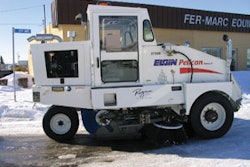

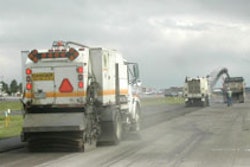



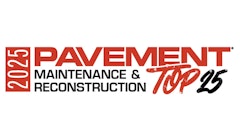
![Pavement Awards 2025[main]](https://img.forconstructionpros.com/files/base/acbm/fcp/image/2024/05/PavementAwards_2025_main_.665883e4276e8.png?ar=16%3A9&auto=format%2Ccompress&bg=fff&fill-color=fff&fit=fill&h=135&q=70&w=240)



